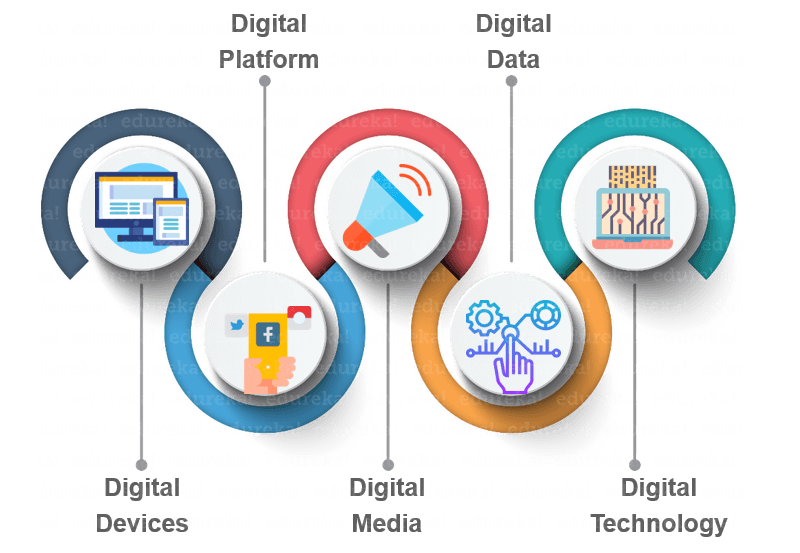There is a huge difference between surviving and thriving, and as a business owner, you might already be familiar with it. But are you familiar with the role of Digital Marketing in your business? In today’s world where the Internet is entwined with everything we do, the importance of Digital Marketing has become crystal clear. It has become an integral part of what business means to its customers. This blog on What is Digital Marketing will walk you through the following topics –
Digital Marketing encompasses all marketing efforts that promote your product or brand using electronic devices or the internet. It leverages online marketing tactics like search marketing, email marketing, social media marketing, and mobile marketing to connect with current and prospective customers.
Now that you have understood What is Digital Marketing, let us have a look at the 5Ds of Digital Marketing.

Digital devices – Your audience experiences your brands as they interact with the websites through digital devices including mobile phones, desktops, tablets, TVs and gaming devices.
Digital platforms – Most interaction on digital devices is through browser or applications from the major platforms like Google, Facebook, Instagram, YouTube, Twitter, and LinkedIn.
Digital media – Different owned, paid and earned communications channels to reach and engage with your audience.
Digital data – Insights that businesses collect about their audience and their interaction with businesses.
Digital technology – Businesses use to create interactive experiences from websites and apps to in-store kiosks and email campaigns.
Since Digital Marketing has so many options and strategies associated with it, you can get creative and experiment with a variety of marketing campaigns. With Digital Marketing, you can also use analytics tools to monitor the success and ROI of your campaigns.
Think about the last important purchase you made. Before buying, you probably would have searched the internet to learn about the product you wanted and what your best options were. And your ultimate buying decision would have been based on the customer reviews, features, and pricing you researched.
Purchasing decisions begin online today. Hence, an online presence is absolutely necessary regardless of what you sell.
You need to build a marketing strategy that puts you in places your followers are already hanging out and connects you with them in a multitude of ways, like –
When you put all these pieces together, you get an efficient, easy-to-operate Digital Marketing machine. Although it seems intimidating to build that machine from scratch, it is as simple as learning and integrating one Digital Marketing tactic at a time.
SEO is the process of optimizing content, technical set-up, and reach of your website so that your pages appear at the top of a search engine result for specific keywords. The ultimate goal is to attract visitors to your website when they search for products or services related to your business.
SEO enforces the need for a user-friendly website, valuable and engaging content, and credibility for other websites and visitors to recommend you by linking to your website or tagging you in their social media posts. There are a number of ways to approach SEO to generate traffic to your website. These include –
Some channels where you can use PPC are –
Fore more infomation subscribe our website- https://worldtechad.blogspot.com/
- What is Digital Marketing?
- The 5Ds of Digital Marketing
- Why Digital Marketing?
- How Does Digital Marketing Work?
- Marketing Channels in Digital Marketing
- What is the Role of Digital Marketing for Your Business?
Digital Marketing encompasses all marketing efforts that promote your product or brand using electronic devices or the internet. It leverages online marketing tactics like search marketing, email marketing, social media marketing, and mobile marketing to connect with current and prospective customers.
Now that you have understood What is Digital Marketing, let us have a look at the 5Ds of Digital Marketing.
The 5Ds of Digital Marketing
The 5Ds in Digital Marketing define the opportunities for consumers to interact with brands and for businesses to reach out to their audiences in different ways. The 5Ds of Digital Marketing are –
Digital devices – Your audience experiences your brands as they interact with the websites through digital devices including mobile phones, desktops, tablets, TVs and gaming devices.
Digital platforms – Most interaction on digital devices is through browser or applications from the major platforms like Google, Facebook, Instagram, YouTube, Twitter, and LinkedIn.
Digital media – Different owned, paid and earned communications channels to reach and engage with your audience.
Digital data – Insights that businesses collect about their audience and their interaction with businesses.
Digital technology – Businesses use to create interactive experiences from websites and apps to in-store kiosks and email campaigns.
Why Digital Marketing?
While traditional marketing might exist in print ads, phone communication, or physical marketing, Digital Marketing occurs electronically and online. This means that there are endless possibilities for brands including video, email, social media, or website-based marketing opportunities.Since Digital Marketing has so many options and strategies associated with it, you can get creative and experiment with a variety of marketing campaigns. With Digital Marketing, you can also use analytics tools to monitor the success and ROI of your campaigns.
How Does Digital Marketing Work?
Digital Marketing is no different from traditional marketing. Both require smart organizations to develop mutually beneficial relationships with prospects, leads, and customers. Yet, Digital Marketing has replaced most traditional marketing tactics as it is designed to reach today’s consumers.Think about the last important purchase you made. Before buying, you probably would have searched the internet to learn about the product you wanted and what your best options were. And your ultimate buying decision would have been based on the customer reviews, features, and pricing you researched.
Purchasing decisions begin online today. Hence, an online presence is absolutely necessary regardless of what you sell.
You need to build a marketing strategy that puts you in places your followers are already hanging out and connects you with them in a multitude of ways, like –
- Providing them content to keep them updated with industry news
- Social media shares that content and engages with the audience as friends and followers
- Search engine optimization optimizes your content, so it shows up when someone searches for the information you’ve written about
- Advertising drives paid traffic to your website, where people can find your offers
- Email marketing follows up with your audience to make sure they continue to get the solutions they’re looking for
When you put all these pieces together, you get an efficient, easy-to-operate Digital Marketing machine. Although it seems intimidating to build that machine from scratch, it is as simple as learning and integrating one Digital Marketing tactic at a time.
Marketing Channels in Digital Marketing
 Search Engine Optimization
Search Engine Optimization
SEO is the process of optimizing content, technical set-up, and reach of your website so that your pages appear at the top of a search engine result for specific keywords. The ultimate goal is to attract visitors to your website when they search for products or services related to your business.SEO enforces the need for a user-friendly website, valuable and engaging content, and credibility for other websites and visitors to recommend you by linking to your website or tagging you in their social media posts. There are a number of ways to approach SEO to generate traffic to your website. These include –
- On-page SEO: It focuses on the content that exists “on the page” on a website. By researching keywords for their search volume and intent (or meaning), you can answer questions for readers and rank higher on the search engine results pages (SERPs) those questions produce.
- Off-page SEO: It focuses on all the activities that take place “off the page” when looking to optimize your website. What are these activities that are not on-page but affect your ranking? The answer is “backlinks”. The number of publishers that link to you, and the relative “authority” of those publishers, affect how you rank for specific keywords you. You can earn the backlinks by networking with other publishers, writing guest posts on these websites, and generating external attention.
- Technical SEO: It focuses on the backend of your website. Image compression, CSS file optimization, and structured data are different forms of technical SEO that can increase your website’s loading speed that is an important ranking factor for search engines.
Content Marketing
Have you heard the saying, “Content is king?”. Quality content is the fuel that drives your Digital Marketing strategies. Content Marketing denotes the creation and promotion of content assets in order to generate brand awareness, lead generation, traffic growth, and customers. The channels that play a part in your content marketing include:- Videos: YouTube is now the second-largest search engine on the internet and videos are completely taking over the digital marketing world. The use of video in content marketing is on the rise and it definitely demands a front-runner position in your content marketing plan. The number one reason for this is that videos convert more customers. A recent report shows that 71% of marketers say video conversion rates outperform other marketing content.
- Blog posts: Writing and publishing articles on a company blog help you demonstrate your industry expertise and generate organic search traffic for your website. This gives you an opportunity to convert the website visitors into leads.
- Ebooks and whitepapers: Ebooks, whitepapers, and similar long-form content help educate website visitors. It allows you to exchange content for a reader’s contact information, generating leads for your company.
- Infographics: Infographics are a form of visual content that helps your website visitors visualize a concept that you want to help them learn.
Paid Search
Paid search, or pay-per-click (PPC) advertising refers to the “sponsored result” on the search engine results pages (SERP). PPC ads are visible, flexible, and effective for many different types of organizations. With paid search, you only pay when your ad is clicked. You can tailor your ads to appear when specific search phrases are entered, targeting them to a particular audience.Some channels where you can use PPC are –
- Paid ads on Facebook: Users can pay to customize a video or image post, which Facebook will publish to the newsfeeds of people who match your business.
- Twitter Ads campaigns: Users can pay to place a series of posts to the news feeds of a specific audience, all dedicated to accomplishing a specific goal for your business. This goal can be website traffic, Twitter followers, tweet engagement, or app downloads.
- Sponsored Messages on LinkedIn: Users can pay to send messages to LinkedIn users based on their industry and background.
Social Media Marketing
Social Media Marketing promotes your brand and content on social media channels in order to increase your brand awareness, drive relevant traffic, and generate leads.Fore more infomation subscribe our website- https://worldtechad.blogspot.com/


Post a Comment